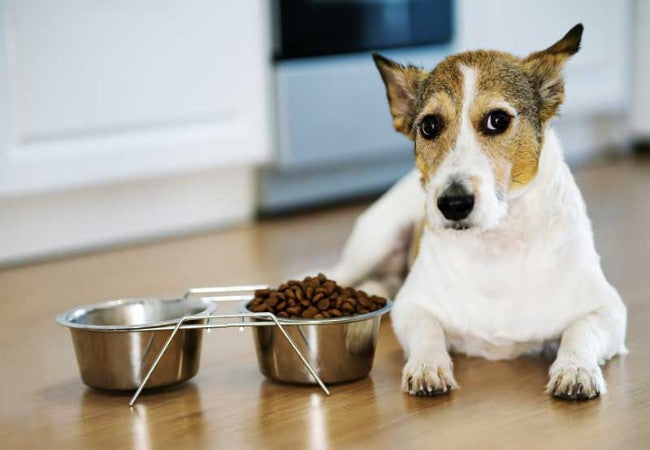What to Feed a Dog with Diarrhea 2025: Vet Approved Recovery Guide 🐶

In this article
What to Feed a Dog with Diarrhea 2025: Vet Approved Recovery Guide 🐶
By Dr. Duncan Houston BVSc
🚨 When Your Dog Has Diarrhea: First Steps
Diarrhea can be stressful—but with prompt, safe feeding and supportive care, most healthy dogs recover quickly. If your dog has diarrhea but no vomiting and is otherwise bright and drinking, here’s what you should do :
- ✅ Ensure unlimited fresh water—diarrhea can quickly cause dehydration
- ⏳ Optional short fast (12–24 hrs) may give the gut time to rest—skip with puppies, seniors, or ill dogs
Warning signs to see your vet immediately: vomiting, lethargy, blood/mucus in stool, diarrhea lasting more than 48 hrs, loss of appetite, or collapse.
🥄 What Is a Bland Diet?
A bland diet is easy to digest, low in fat and fiber, and gentle on the gut. Common ingredients include:
- ♨️ White rice or boiled potatoes—bulk up stool, absorb water
- 🥩 Lean protein (boiled chicken, turkey, lean beef)—low-fat and gentle
- 🎃 Canned plain pumpkin—rich in fiber, soothes digestion
- 🥔 Mashed potatoes, oats, carrots—as alternative binders and fiber sources
Commercial gastrointestinal diets (Hill’s i/d, Royal Canin GI, Purina EN) offer complete nutrition and are easy on the stomach for acute or chronic cases.
🍽️ Bland Diet Protocol (Step-by-Step)
- Day 0–1 (Optional Fast): Withhold food up to 24 hrs, ensure hydration with water, rice water, or low-sodium broth.
- Day 1–3: Feed bland diet in small frequent meals—e.g., 1 tbsp per 10 lb every 2–3 hrs, using 1 c protein to 1 c carb.
- Day 3–5: Gradually increase portion size and decrease meal frequency as stool firms up.
- Day 5–7: Introduce small amounts of regular kibble, mixing 25 % kibble with bland food, reaching full kibble by day 7 if tolerated.
- Chronic/Long-Term Cases: Use prescription GI diet under vet supervision; homemade diets are not balanced long-term.
Adjustments may be needed for seniors, puppies, and dogs with health issues—always consult your vet for tailored advice.
🧴 Hydration & Supportive Supplements
- Hydration: Offer multiple bowls and encourage drinking; use diluted Pedialyte or rice water for extra electrolytes.
- Broth: Low-sodium chicken or beef broth can boost palatability.
- Probiotics: FortiFlora, Proviable, Benebac, Purina FortiFlora—can restore gut flora; use for acute or chronic diarrhea.
- Fiber Boost: Pumpkin, boiled carrot, oats—add gradually to avoid gas and only after stable stool begins.
⚠️ When to Call the Veterinarian
- Diarrhea longer than 48 hrs
- Vomiting, lethargy, loss of appetite
- Blood or mucus in stool, painful abdomen
- Dehydration, unusual signs
- Puppies, seniors, or immunocompromised dogs—never fast them
Veterinary care may include stool tests, bloodwork, anti-diarrheal treatment, deworming, fluids, or hospitalization if severe.
📋 Follow-Up Care & Prevention
- Maintain GI prescription or sensitive-stomach diet long-term as advised
- Gradually change diets over 10–14 days to prevent upset
- Daily probiotics during transitional periods
- Avoid table scraps and sudden diet changes
- Use parasite control and stress reduction strategies
🌟 Quick Summary
| Problem | Home Protocol | Vet Action |
|---|---|---|
| Dog has diarrhea, no vomiting | Hydration + bland diet + probiotics | If no improvement in 48 hrs—vet consult |
| Vomiting, blood, lethargy | Don't fast—consult vet immediately | Deeper diagnostics, fluids, prescription diet |
| Chronic diarrhea | Use GI prescription diet + fiber/probiotics | Investigate IBD, allergies, organ disease |
🐾 Dr Houston’s Final Advice
Most healthy dogs with mild diarrhea can recover comfortably at home using a bland diet, proper hydration, and gentle probiotics. The key is to monitor closely—if conditions worsen or persist, seek veterinary guidance quickly.
Have questions about your dog’s diet, transition plan, or recovery? Visit AskAVet.com or download the Ask A Vet app for 24/7 expert veterinary support. 🐶📱






